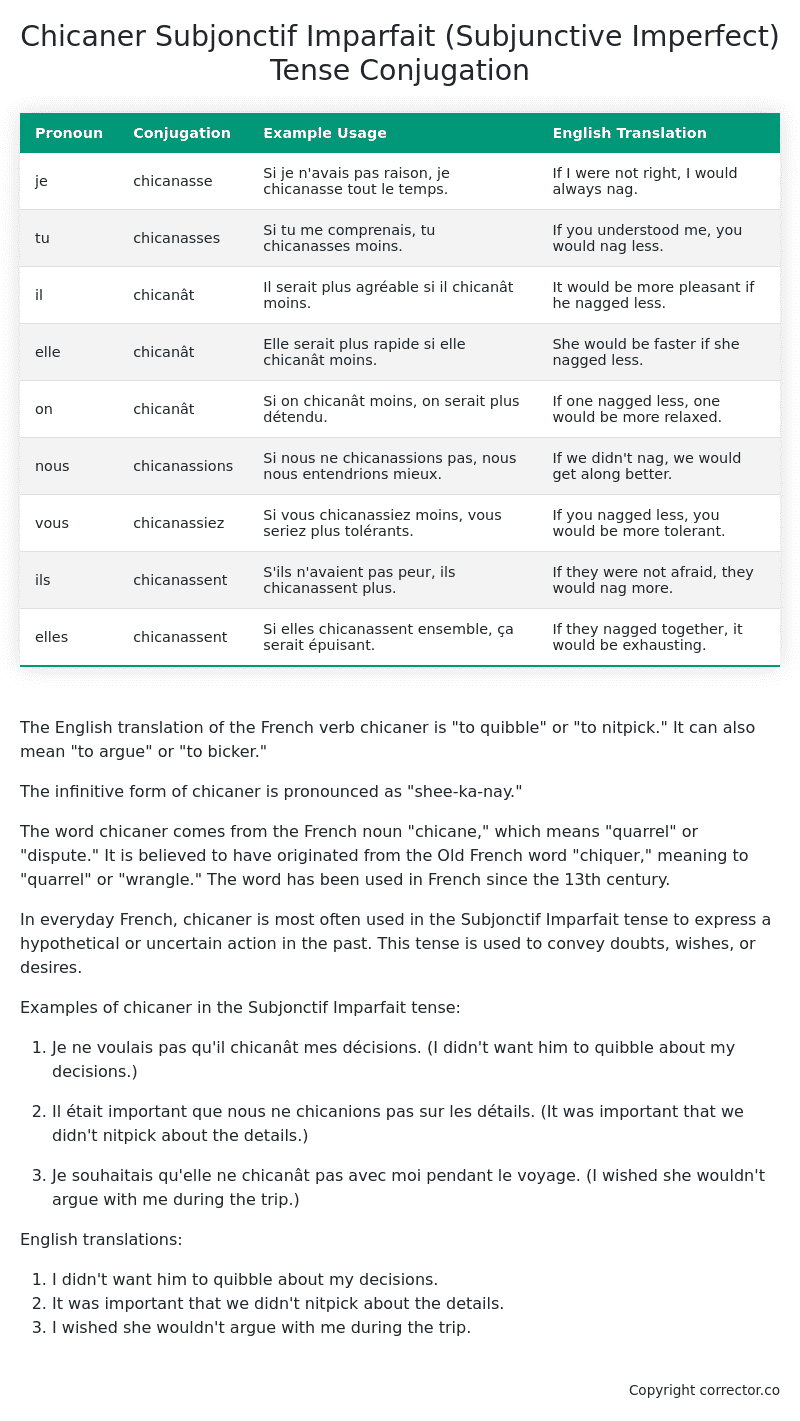Subjonctif Imparfait (Subjunctive Imperfect) Tense Conjugation of the French Verb chicaner
Introduction to the verb chicaner
The English translation of the French verb chicaner is “to quibble” or “to nitpick.” It can also mean “to argue” or “to bicker.”
The infinitive form of chicaner is pronounced as “shee-ka-nay.”
The word chicaner comes from the French noun “chicane,” which means “quarrel” or “dispute.” It is believed to have originated from the Old French word “chiquer,” meaning to “quarrel” or “wrangle.” The word has been used in French since the 13th century.
In everyday French, chicaner is most often used in the Subjonctif Imparfait tense to express a hypothetical or uncertain action in the past. This tense is used to convey doubts, wishes, or desires.
Examples of chicaner in the Subjonctif Imparfait tense:
-
Je ne voulais pas qu’il chicanât mes décisions. (I didn’t want him to quibble about my decisions.)
-
Il était important que nous ne chicanions pas sur les détails. (It was important that we didn’t nitpick about the details.)
-
Je souhaitais qu’elle ne chicanât pas avec moi pendant le voyage. (I wished she wouldn’t argue with me during the trip.)
English translations:
- I didn’t want him to quibble about my decisions.
- It was important that we didn’t nitpick about the details.
- I wished she wouldn’t argue with me during the trip.
Table of the Subjonctif Imparfait (Subjunctive Imperfect) Tense Conjugation of chicaner
| Pronoun | Conjugation | Example Usage | English Translation |
|---|---|---|---|
| je | chicanasse | Si je n’avais pas raison, je chicanasse tout le temps. | If I were not right, I would always nag. |
| tu | chicanasses | Si tu me comprenais, tu chicanasses moins. | If you understood me, you would nag less. |
| il | chicanât | Il serait plus agréable si il chicanât moins. | It would be more pleasant if he nagged less. |
| elle | chicanât | Elle serait plus rapide si elle chicanât moins. | She would be faster if she nagged less. |
| on | chicanât | Si on chicanât moins, on serait plus détendu. | If one nagged less, one would be more relaxed. |
| nous | chicanassions | Si nous ne chicanassions pas, nous nous entendrions mieux. | If we didn’t nag, we would get along better. |
| vous | chicanassiez | Si vous chicanassiez moins, vous seriez plus tolérants. | If you nagged less, you would be more tolerant. |
| ils | chicanassent | S’ils n’avaient pas peur, ils chicanassent plus. | If they were not afraid, they would nag more. |
| elles | chicanassent | Si elles chicanassent ensemble, ça serait épuisant. | If they nagged together, it would be exhausting. |
Other Conjugations for Chicaner.
Le Present (Present Tense) Conjugation of the French Verb chicaner
Imparfait (Imperfect) Tense Conjugation of the French Verb chicaner
Passé Simple (Simple Past) Tense Conjugation of the French Verb chicaner
Passé Composé (Present Perfect) Tense Conjugation of the French Verb chicaner
Futur Simple (Simple Future) Tense Conjugation of the French Verb chicaner
Futur Proche (Near Future) Tense Conjugation of the French Verb chicaner
Plus-que-parfait (Pluperfect) Tense Conjugation of the French Verb chicaner
Passé Antérieur (Past Anterior) Tense Conjugation of the French Verb chicaner
Futur Antérieur (Future Anterior) Tense Conjugation of the French Verb chicaner
Subjonctif Présent (Subjunctive Present) Tense Conjugation of the French Verb chicaner
Subjonctif Passé (Subjunctive Past) Tense Conjugation of the French Verb chicaner
Subjonctif Imparfait (Subjunctive Imperfect) Tense Conjugation of the French Verb chicaner (this article)
Subjonctif Plus-que-parfait (Subjunctive Pluperfect) Tense Conjugation of the French Verb chicaner
Conditionnel Présent (Conditional Present) Tense Conjugation of the French Verb chicaner
Conditionnel Passé (Conditional Past) Tense Conjugation of the French Verb chicaner
L’impératif Présent (Imperative Present) Tense Conjugation of the French Verb chicaner
L’infinitif Présent (Infinitive Present) Tense Conjugation of the French Verb chicaner
Struggling with French verbs or the language in general? Why not use our free French Grammar Checker – no registration required!
Get a FREE Download Study Sheet of this Conjugation 🔥
Simply right click the image below, click “save image” and get your free reference for the chicaner Subjonctif Imparfait tense conjugation!

Chicaner – About the French Subjonctif Imparfait (Subjunctive Imperfect) Tense
Formation
Common Everyday Usage Patterns
Interactions with Other Tenses
Subjonctif Présent
Indicatif Passé Composé
Conditional
Conditional Perfect
Summary
I hope you enjoyed this article on the verb chicaner. Still in a learning mood? Check out another TOTALLY random French verb conjugation!


